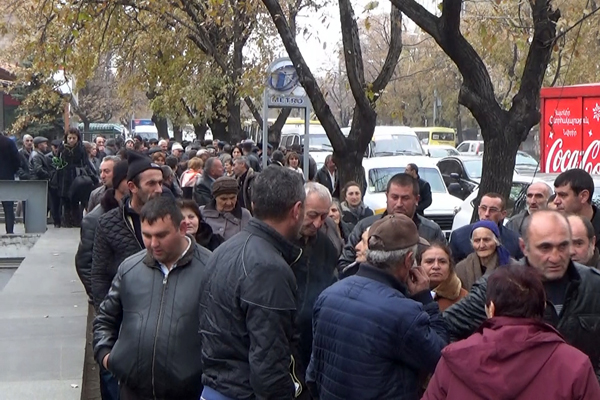“We are neither terrorists nor suicide bombers; we are ordinary people who want their president to meet them,” dozens of former residents of the the ethnically Armenian enclave of Artsvashen, which Azerbaijan gained control over during the Armenian-Azerbaijani conflict in 1992, stated today during a demonstration outside the presidential residence in Yerevan. After Arstvashen was seized by Azerbaijani forces, around 3000 people were forced to leave their homes and move to the town of Chambarak in Gegharkunik province. Today, some of these people gathered in Yerevan to demand that the Armenian authorities either provide them with apartments or compensate them for the money they spent to renovate houses in Chambarak.
“We left Artsvashen with nothing and took refuge in Chambarak houses formerly inhabited by either Azerbaijanis or Molokans. They were already in a state of disrepair when me moved in, and today these houses are practically unlivable. We have been neglected by the authorities for over 25 years,” the demonstrators told reporters.
According one of the protesters, in 2009 the Government decided to allocate 5.9 billion drams to renovate the houses in Chambarak; in December 2011, however, they provided each former Artsvashen resident which 360 000 drams, 708 millions in total, after which the program was discontinued. “360 thousand is nothing; it’s a day’s shopping money for an official’s wife,” the protesters argued.
Hoping that they would eventually be given the rest of the money, the residents took out loans and renovated the houses themselves; however, they have yet to be compensated for the 4 billion drams worth of expanses.
The residents have fruitlessly appealed both to local officials and representatives of the government; they have written dozens of letters which they have yet to get responses to.
The demonstrators, most of whom get their income mainly from cattle-breeding, also complained about the level of unemployment in Chambarak which forces more and more people to leave the town in search of better opportunities. The majority of young men enlist in the army as contract servicemen to get some kind of pay; older men leave for jobs abroad, while women do not have any job opportunities at all.
“Those gathered here are parents of soldiers who serve in Karabakh. How much longer can they go on neglecting us? We’ll send no soldiers to either Karabakh or anywhere else [unless our issues are addressed]. Once we are back, I’m going to tell our sons to leave their positions and let the Azerbaijanis seize those territories. They put their lives in danger on the border, but who’d take care of their kids if anything were to happen to them?” a protester argued.
 Epress.am News from Armenia
Epress.am News from Armenia
